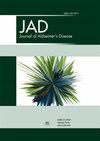High-Fat Diets in Animal Models of Alzheimer’s Disease: How Can Eating Too Much Fat Increase Alzheimer’s Disease Risk?
IF 3.4
3区 医学
Q2 NEUROSCIENCES
引用次数: 0
Abstract
High dietary intake of saturated fatty acids is a suspected risk factor for neurodegenerative diseases, including Alzheimer’s disease (AD). To decipher the causal link behind these associations, high-fat diets (HFD) have been repeatedly investigated in animal models. Preclinical studies allow full control over dietary composition, avoiding ethical concerns in clinical trials. The goal of the present article is to provide a narrative review of reports on HFD in animal models of AD. Eligibility criteria included mouse models of AD fed a HFD defined as > 35% of fat/weight and western diets containing > 1% cholesterol or > 15% sugar. MEDLINE and Embase databases were searched from 1946 to August 2022, and 32 preclinical studies were included in the review. HFD-induced obesity and metabolic disturbances such as insulin resistance and glucose intolerance have been replicated in most studies, but with methodological variability. Most studies have found an aggravating effect of HFD on brain Aβ pathology, whereas tau pathology has been much less studied, and results are more equivocal. While most reports show HFD-induced impairment on cognitive behavior, confounding factors may blur their interpretation. In summary, despite conflicting results, exposing rodents to diets highly enriched in saturated fat induces not only metabolic defects, but also cognitive impairment often accompanied by aggravated neuropathological markers, most notably Aβ burden. Although there are important variations between methods, particularly the lack of diet characterization, these studies collectively suggest that excessive intake of saturated fat should be avoided in order to lower the incidence of AD.阿尔茨海默病动物模型中的高脂饮食:摄入过多脂肪如何增加阿尔茨海默病风险?
从膳食中摄入大量饱和脂肪酸被怀疑是包括阿尔茨海默病(AD)在内的神经退行性疾病的危险因素。为了破译这些关联背后的因果联系,人们在动物模型中对高脂饮食(HFD)进行了反复研究。临床前研究可以完全控制饮食成分,避免了临床试验中的伦理问题。本文旨在对有关高脂饮食在 AD 动物模型中应用的报道进行叙述性综述。资格标准包括以脂肪含量大于 35%/ 重量的高脂饮食和胆固醇含量大于 1%或糖含量大于 15%的西式饮食喂养的 AD 小鼠模型。我们检索了1946年至2022年8月的MEDLINE和Embase数据库,共纳入了32项临床前研究。大多数研究都证实了高密度脂蛋白胆固醇诱发的肥胖和代谢紊乱,如胰岛素抵抗和葡萄糖不耐受,但研究方法存在差异。大多数研究发现,高频分解膳食对大脑 Aβ 病理学有加重作用,而对 tau 病理学的研究要少得多,结果也比较模糊。虽然大多数报告显示高氟酸脱氢引发的认知行为障碍,但混杂因素可能会模糊其解释。总之,尽管结果相互矛盾,但将啮齿类动物暴露于富含饱和脂肪的饮食中,不仅会诱发代谢缺陷,而且还会诱发认知障碍,通常还伴随着神经病理学标志物的加重,其中最显著的是 Aβ 负担。尽管不同研究方法之间存在很大差异,尤其是缺乏饮食特征描述,但这些研究共同表明,应避免摄入过量饱和脂肪,以降低注意力缺失症的发病率。
本文章由计算机程序翻译,如有差异,请以英文原文为准。
求助全文
约1分钟内获得全文
求助全文
来源期刊

Journal of Alzheimer's Disease
医学-神经科学
CiteScore
6.40
自引率
7.50%
发文量
1327
审稿时长
2 months
期刊介绍:
The Journal of Alzheimer''s Disease (JAD) is an international multidisciplinary journal to facilitate progress in understanding the etiology, pathogenesis, epidemiology, genetics, behavior, treatment and psychology of Alzheimer''s disease. The journal publishes research reports, reviews, short communications, hypotheses, ethics reviews, book reviews, and letters-to-the-editor. The journal is dedicated to providing an open forum for original research that will expedite our fundamental understanding of Alzheimer''s disease.
文献相关原料
| 公司名称 | 产品信息 | 采购帮参考价格 |
|---|
 求助内容:
求助内容: 应助结果提醒方式:
应助结果提醒方式:


